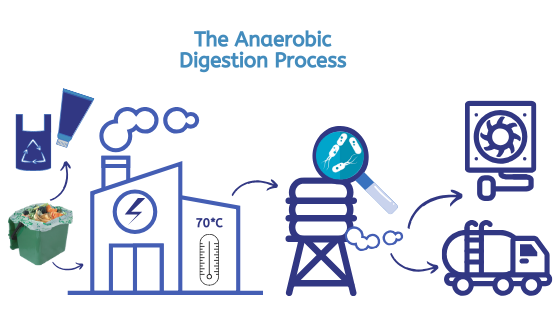What is food waste?
Food waste is any food that is not eaten and is thrown away instead. This might be because it has gone past its sell by date, because it didn’t look normal so isn’t sold in the supermarket or due to cooking too much and throwing some away. It is better to reduce food waste than recycle, by not buying or cooking too much.
Wow fact: The average family of 4 wastes up to £720 a year by throwing food away!
What are the benefits of recycling food waste?
- Better for our environment – If food waste goes to a landfill site it produces a harmful gas (methane) and liquid (leachate) which can harm our natural environment.
- Creating renewable energy – anaerobic digestion is one way of recycling food waste and makes fertiliser, electricity and heat. 1 KG of food waste charges a smartphone for 79 hours!
- Saving resources – it takes a huge amount of energy and water to grow food and even more resources such as fuel to transport the food to supermarkets across the country. Throwing away food means that we have wasted all of this effort and resources.

Devon’s food waste arrives at the anaerobic digestion plant
When the food is chewed up, anything that isn’t food e.g. plastic and packaging, is removed.
The mushed food is then heated to 70°C for 1 hour to kill any bacteria or pathogens that might cause disease.
The waste is fed into large digestion tanks where it stays for around 55 days
Micro-organisms break down the waste and release methane
Methane gas is captured and can be used to power generators to create electricity!
After anaerobic digestion the remaining waste can be used as a fertiliser to improve soil as it is high in nutrients. This is spread onto the fields and it helps to grow more food!
Where does your food waste go?
In Devon all our food waste gets sent to be anaerobically digested, hover over the process diagram to discover what happens to your food waste.
Food waste is not only recycled by anaerobic digestion, it can also be composted! To learn more about compost, click here.
Where can you recycle food waste?
In Devon all areas, apart from Plymouth City (Exeter City is rolling out food waste collections), collect food waste using special food waste bins. To find out more about what you can recycle and where it is recycled in your area click here.
Zero Waste Lunches
How much waste does your school create at lunch time? Does your school encourage pupils to have a zero-waste lunch? Could you design a zero-waste lunch box?
These and many more questions can be answered with our great resources about zero-waste lunches. Use these in the classroom or as part of a whole school project, or with an eco-group to help your school reduce waste.
Compost Curriculum
Click here to find out more about how you can use compost as part of your curriculum and get help starting a school compost scheme.
